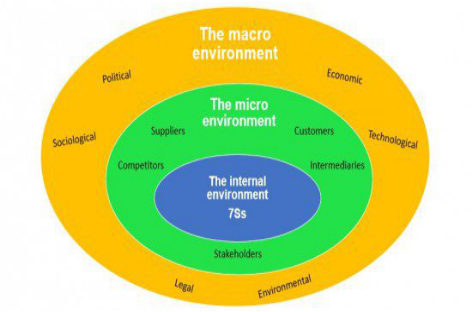Introduction
International or global marketing occurs when organization plans to expand its product line and services on international basis. This helps in increasing its target market, opportunities, market share, etc. It has the biggest barrier that is competition. In this report, the firm selected is Next PLC which is a British multinational company of clothing, footwear and home products (Czinkota and Ronkainen, 2012). Next PLC is looking for international expansion to boost its highly-profitable online sales over the coming years. This report will guide Next PLC to have the best international market for expansion.
TASK 1
1.1 Analysis Of Macro And Micro Factors That Are Having Impact On The Retail Market
Macro factors shape the organization to perform its business. This factor includes various elements like technology, government, climate, culture, interest rates, foreign competition, exchange rate etc. (Doole and Lowe, 2008) In order to understand the macro factors, tool of PESTEL analysis can be used which is as follows:

Illustration 1: Macro and Micro factors
Technological Factor: This helps in developing new products for companies of retail but it also plays a vital role in changing the way of doing business. Technology improvements like internet have enhanced more shopping options to the customers (Hanlon, 2014). Online retail companies like Amazon and e-bay have enabled the web based retail and online shopping. With the help of point-of-sale system, retail firms are able to process check, cash, credit cards, etc.
Government: Due to government policies, laws, rules and regulations, there are number of negative as well as positive effects on retail market. Bank loans, subsidies, etc. are very helpful for retailers to grow and allow established organizations to provide their customers with cost deduction on commodities (Brady, 2014). Government can also impose regulations which increase the costs for development, for adopting new system, etc. Further, government is also very supportive by providing various transportation facilities to the retailer like rail, road, water, etc. for exporting goods and services.
Economic Factors: The sale done by economic factors are driven by economic environment (Paul, 2008). When the demand of a commodity increases, then it allows selling more by the retailers. Vise-versa happens in the case when demand decreases.
Social Factors: Due to change in trends and values of society, it has a great impact on the products which retailers sell. Retailers should develop a product by keeping in mind the social responsibilities towards customers. Micro factors involve the availability of resources and its usage which have their impacts on businesses as well as on individuals. Following are the elements of micro environment:
Customers: They have a direct impact on the retail businesses. It is very simple to understand that business will not be successful if the firm does not attract customers (Curry, 2009). Developing a relation and attracting customers by adopting various offers are very important for the growth of retail industry.
Employees: They are the one who produce, provide or sell the services and goods. For an organization, it is very important to have skilled, motivated and hardworking employees for economic success.
Suppliers: They are the one who deliver materials to the firm. Organization should develop a strong relation with suppliers so that they would supply the material on time (Srinivasan, 2008). Maintains a strong relation will also help in getting quality products which will help in attracting more customers.
Investors: They are very helpful in providing funds to the organization. Funds are useful for the firm to grow. Investors are more supportive than creditors as they share the risk but fund taken from creditors has to be repaid.
Competitors: When competition increases, the level of risk enhances also as well as other firms will apply many strategies in attracting more customers (Glowik and Smyczek, 2011).
Intermediaries: These are the middlemen who come in between the manufacturer and customers. Cost of commodity increases due to these intermediaries.
1.2 Evaluation of market potential to include an identified shortlist of markets with potential
The market potential is establishing maximum revenue for sales of suppliers of a product at a specific time. It is normally measured by the sales volume or sales value. A market research is important to know about the market potential and it will help to know the ability to compete, opportunity available, growth potential, etc. (Bergkvist and Rossiter, 2007). Following are the countries where Next PLC can establish its market:
Sri Lanka:
- Competition: In retail industry and specifically for clothing, the competition is less in this nation. There are totally 19 retail stores in Sri Lanka. More specifically, among these 19 stores, 15 of them are in Colombo. They have many states left out where there are no retail shops. The market potential in this country is high as the competition is very less. This will allow the retail firms to have greater sales (Boddewyn, Soehl and Picard, 2009). Moreover, it can have vast distribution as there are many states in Sri Lanka where retail stores can be established.
- Economic and political stability have funded Sri Lanka for infrastructural development which has made it one of the new real estate markets in Asia pacific region. Economic growth will help the retail firm to ride high and it has helped in increasing the per capita income.
- Sri Lanka's retail is driven by domestic customers who are followed by tourist's consumption. As a result of this, domestic customers have increased disposable income.
- Rise in population: There are around 21 million lives in Sri Lanka. As a result, the increase in demand for everything increases. So, it will be beneficial for the retail industry (Zhou, Yim and Tse, 2005).
Nigeria:
- Environment: Market potential depends upon the political and economic environments. In Nigeria, the interest rate is low; as a result, people are willing to use credit to purchase costly items. Therefore, the demand for products is high and this increases the product’s overall market potential. In addition to this, the tax rates in Nigeria are also low which also adds to the market potential (Atuahene-Gima, 2005). With these reasons, the retail industry will get benefited in Nigeria as with low interest and tax rates, the customers will buy more and as a result, the market potential will be favourable for retail industry.Use of internet users has boomed the retail industry as internet users have increased up to 10% in the recent years. Online retailing will be very much helpful for Next plc in order to cover the market.
- In Nigeria, they have informal economy where they are allowed to sell items like clothes, food, electronics, etc.
Uganda:
- Utility of the product: In Uganda, people are fashionable and they change according to the latest trends (Olson, Slater and Hult, 2005). This will be beneficial for the retail industry as number of products to be sold will be preferred by maximum people as they are adoptable to change. In addition to this, the policies by government are very lenient. New market can easily enter in Uganda.
1.3 Clear and identified screening criteria for selecting two recommended market with clear justification for selecting these markets
From the above-given countries, Nigeria and Sri Lanka are the best-recommended markets. Points that will support them are as follows:
- Government: The government in Sri Lanka and Nigeria adopts a free market. In a market, monetary and fiscal have a great effect on the financial market place. In most of the foreign countries, there is a rule that foreign firms should have local partners but in Uganda and Nigeria, there is no such rule (Douglas and Craig, 2006). Moreover, the interest and tax rate is low due to which the people are able to buy more expensive products.
- Geographical Area: The area and population in Nigeria are very high as a result, the target audience is large. A large population will help in having a large customer base. The only drawback is that the needs and preference of customers will be different. So, in such a case, the firm should develop goods and services according to the needs and wants of customers.
- Competition Level: Retail markets in Nigeria and Sri Lanka are very less in comparison to other countries (Kirca, Jayachandran and Bearden, 2005). Less competition will help in having a greater opportunity for the retail industry to have a huge profit as the customers have few substitutes of the same products. The demand for a product will be high as customers have to go for the only available product.
- GDP Rate: The growth of GDP in both the countries is very high and according to the estimation, GDP rate will be high till 2025. This shows that the growth rate and demand for products are also very high. This will be beneficial for Next plc. This will enhance the retail products among customers in Nigeria and Sri Lanka as clothing is the basic requirement of every person.
- Increase in the Use of the Internet: In both Nigeria and Sri Lanka, people are educated and this has increased the awareness for the use of internet. According to a survey in the year 2010, internet users were 24.0% which has risen up to 38.0% in 2015. This shows that the internet users are increasing every year at a rate of 6.0%. Retailers will get advantage if they would use online retailing as the customers using internet are increasingly growing.
1.4 A recommended and justified market entry strategy to take Next PLC into these markets
There are many ways through which NEXT plc can enter in the foreign market. There will be a number of factors like taxation rate, tariff rate, transportation cost, etc. which affect the market entry (Vorhies and Morgan, 2005). Following are the strategies which NEXT plc can adopt:
Direct Exporting: This refers to selling directly into the market by using company’s resources. When they develop their sales program, they turn into distributors or agents who would represent then in the market. These distributors or agents will work according to the interest of organization. In other words, they become the face of organization and should be hired as if the firm is selecting a key staff. This is the best strategy which Next plc can adopt to enter in Nigeria as these agents or distributors which are to be hired will be the local individuals who will be having complete knowledge about the market and the customers. This will have a great impact over the customers as these distributors will have a close contact with the customers and they will not be having any language problem. Along with that, these people know the tastes, preferences, culture, etc. better than outsiders (Czinkota and Ronkainen, 2012). There are other market entry strategies but this is the best one. In addition to this, it will also help the government as employment is provided through this.
Licensing: It is a type of arrangement where the firm provides rights to use the services and products to local firms. This strategy will be very useful if the purchaser of license have a large market share. This is also a market entry strategy which can be adopted by Next plc as there are many big retail firms in Sri Lanka like MAS Holdings. If Next plc provides licensing to MAS Holdings then it will be beneficial for the organization as this will help in covering the market or in other words, people will get to know about Next plc. Slowly when the brand loyalty will increase then firm can establish its own stores. Here, this strategy will be useful because the geographical area is less; as a result, covering all states in Sri Lanka will not be a difficult task through licensing. There are many states in Sri Lanka where there are no retail stores. These states are like Vavuniya, Trincomalee and Dumbulla that do not have retail stores (Doole and Lowe, 2008). Through licensing, when the brand loyalty increases then, Next plc should target these states for high growth. Get Online Programming Assignment Help at just 50% OFF.
1.5 Marketing mix for the proposed market
The marketing mix is the set of elements which a company adopts for promoting its products and brand in the market. There are four elements like products, price, place and promotion. This 4p's are like pillars which help the organization to have a systematic plan for their growth. For Nigeria, following marketing mix should be adopted in order to increase their market:
- Product: They will provide garments with the latest designs and in addition to this, Nigerians have their traditional clothing. These traditional cloths are used on a regular basis in many areas of Nigeria and other traditional attire is worn for special occasions. There are basically three different ethical groups in Nigeria and they are Hausa-Fulani, Yoruba and Igbo (Terpstra, Foley and Sarathy, 2012). These three groups have three different cultures and prefer different traditional cloths. In Hausa-Fulani, men prefer wide sleeved robe which is known as babban riga and women uses colourful wrappers called abaya. In Yoruba, they have different cloths for different occasions, that is, dresses like Gele, Agbada, Iro and Sokotos. In Igbo, people wear modern cloths or in other words, they prefer western styled cloths. According to these three groups, Next plc should sell products according to their tradition.
- Price: The people of Nigeria are mostly poor so the prices should be kept low so everyone can be able to afford it.
- Promotion: For promotion, they should use television as a source as it is most commonly used. In addition to this, the internet usage is also increasing so internet should also be used as a promotional tool.
- Place: Abuja which is the capital of Nigeria should be targeted as there; the population is very high as compared with other states.
For Sri Lanka, following marketing mix should be adopted in order to increase their market:
- Product: In Sri Lanka, people easily adapt to change. Next plc can sell the latest western clothing style to Sri Lanka's customers.
- Price: Next plc should adopt low pricing with discount offers as in this nation; most of the population is from middle class category that will get attracted to those products which will provide the high quality with low price (Brady, 2014).
- Place: Colombo is the main place of retailers where there are almost 15 retail clothing stores. Next plc should start with the customers in Colombo.
- Promotion: For promotion, Next plc should use newspapers, the internet, social media, radio, and television, etc.
Conclusion
From this report, it can be articulated that in the macro environment, there are many factors which influence the retail industry and among these factors, government influences the most as it has the right to change the policies according to their preferences and change in culture. Further, Nigeria will be the best place for NEXT plc as there are many opportunities like people wear clothes according to their traditional customs. According to their customs, there are three groups and each group has a different style of fashion. This will help NEXT plc to provide products to the customers according to their preferences and it would help them in covering the market easily. Moreover, Next PLC should adopt direct exporting in Nigeria and licensing should be adopted in Sri Lanka for better market entry.
References
- Atuahene-Gima, K., 2005. Resolving the capability—rigidity paradox in new product innovation. Journal of marketing.
- Bergkvist, L. and Rossiter, J. R., 2007. The predictive validity of multiple-item versus single-item measures of the same constructs. Journal of marketing research.
- Boddewyn, J. J., Soehl, R. and Picard, J., 1986. Standardization in international marketing: is Ted Levitt in fact right?. Business Horizons. 29(6).
- Brady, D. L., 2014. Essentials of International Marketing. Routledge.
- Curry, J. E., 2009. A short course in international marketing [electronic resource]: approaching and penetrating the global marketplace. World Trade Press.
- Czinkota, M. and Ronkainen, I., 2012. International Marketing. Cengage Learning.
- Doole, I. and Lowe, R., 2008. International Marketing Strategy: Analysis, Development and Implementation. Cengage Learning EMEA.















